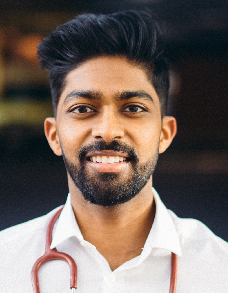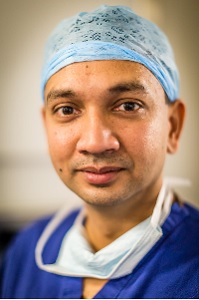A trainee ophthalmologist shares his experience of being redeployed to the frontline of covid-19 preparation and hopes that it will allay fears
The global spread of covid-19 has led to mounting pressure on hospitals. This has generated varying strategies to cope in the NHS, including the cancellation of elective surgery, requests for retired doctors and medical students to join the workforce, and the redeployment of specialty doctors to clinical settings they are not used to. It is this last measure that we want to focus on.
We work at the Royal Free NHS Foundation Trust, an acute medical teaching hospital in central London, which last week introduced a medical covid-19 rota. This rota includes doctors from many different specialties, such as ophthalmology, radiology and dermatology, who are not ordinarily ward based.
For the ophthalmologists this affects, we will have specialised skills dealing in the diagnosis and management of eye disorders. We’ll have undergone two years of foundation training or equivalent, but our medical skills have been used sparsely during our training. The abrupt onset of covid-19 has upended this status quo and necessitated the rapid upskilling of personnel.
Understandably, this has led to a great amount of anxiety for those returning to the frontline. We thought it would be useful for one of us (KA) to share his experience here to hopefully allay fears. As changes begin to happen up and down the country in the next few days, we hope this will be of use.
My first shift
I finished my foundation training eight months ago and have since been undertaking ST1 training in ophthalmology. Time on the wards feels like a lifetime ago for me.
I received an email on Thursday 19 March informing me that from the next day I would be on the medical covid rota (12 hour day and night shifts, with a three days on and three days off pattern) for at least the next 24 days.
I was filled with a deep foreboding at this news. I felt so deskilled and utterly unequipped for the task ahead. I didn’t know where my stethoscope was, how to order a chest X ray or bloods, or any number of tasks.
I turned up at 8pm the next night to the medical handover and was instantly reassured. The teams behind these strategies understand that we have lives, that we have families back at home, and that we are scared. At handover there were 30 juniors and five consultants, compared to the usual five night medical doctors. We were divided into teams of six (two SpRs, two SHOs, and two FY1s). ST1 and ST2 ophthalmologists were classed as SHOs. All ophthalmologists above ST2 level were classed as FY1s.
When it comes to working on the ward, I think that the expectation from other medics may initially be that ophthalmologists won’t be able to contribute as much, and that we’ll have to be taught everything about the IT system, when to escalate etc. Management has deliberately got us on the wards early to allow us to get our induction, our PPE training, and all our questions answered before the tsunami they predict is coming hits.
With regard to personal protective equipment (PPE), I was worried that I’d had no previous training on masks, putting them on, or checking for an appropriate fit. It seems like there are two types of FFP3 masks (one that requires fitting, and one that does not). When seeing a patient with suspected or confirmed covid-19, the guidance is to wear a surgical mask, apron, and gloves. For crash calls and other aerosol inducing procedures, full PPE is required. Public Health England’s guidance can be found here. There is a clear protocol for procedures such as venepuncture. I was given full training during my first shift on all of this and it was emphasised that these are rules that are not meant to be broken in any circumstance despite this pandemic.
During the shift there were plenty of on-site consultants around. For every patient, there is a clear escalation plan. My job currently involves documenting, preparing discharge summaries, making referrals, and calling families.
This is a marathon and the goalposts are moving every hour. I was so nervous starting the first shift, but I am so glad for the experience.
All in this together
This is coming for all of us: from the ST1s up to the ST7s, and very soon we’re sure the ophthalmology consultants too.
These are unprecedented times and will place a strain on all of us. Yet we are all doctors, first and foremost. We have all taken oaths and over the next few months we will have to uphold this in ways that we were not expecting to. We are all scared but we are all in this together. Our medical colleagues are no less frightened than we are—no specialty was prepared for this pandemic.
We will get through this and we will be back in the safe haven of our clinic rooms and operating theatres before we know it. But for now we have to stand united with all our NHS colleagues and stay positive.
 Kirupakaran Arun is a North London ST1 ophthalmology trainee based at the Royal Free Hospital. He ranked third nationally in Ophthalmology National Recruitment. He graduated from the University of Cambridge in 2017. Twitter @ArunKirupakaran
Kirupakaran Arun is a North London ST1 ophthalmology trainee based at the Royal Free Hospital. He ranked third nationally in Ophthalmology National Recruitment. He graduated from the University of Cambridge in 2017. Twitter @ArunKirupakaran
Competing interests: We have read and understood BMJ policy on declaration of interests and have no interests to declare.
 Saurabh Jain is a consultant ophthalmologist and the clinical director of ophthalmology at the Royal Free NHS London Foundation Trust. He is also training program director at Health Education England and specialises in paediatric ophthalmology, strabismus, and cataract surgery. Twitter @LondonEyeDoc
Saurabh Jain is a consultant ophthalmologist and the clinical director of ophthalmology at the Royal Free NHS London Foundation Trust. He is also training program director at Health Education England and specialises in paediatric ophthalmology, strabismus, and cataract surgery. Twitter @LondonEyeDoc
Competing interests: We have read and understood BMJ policy on declaration of interests and have no interests to declare.
